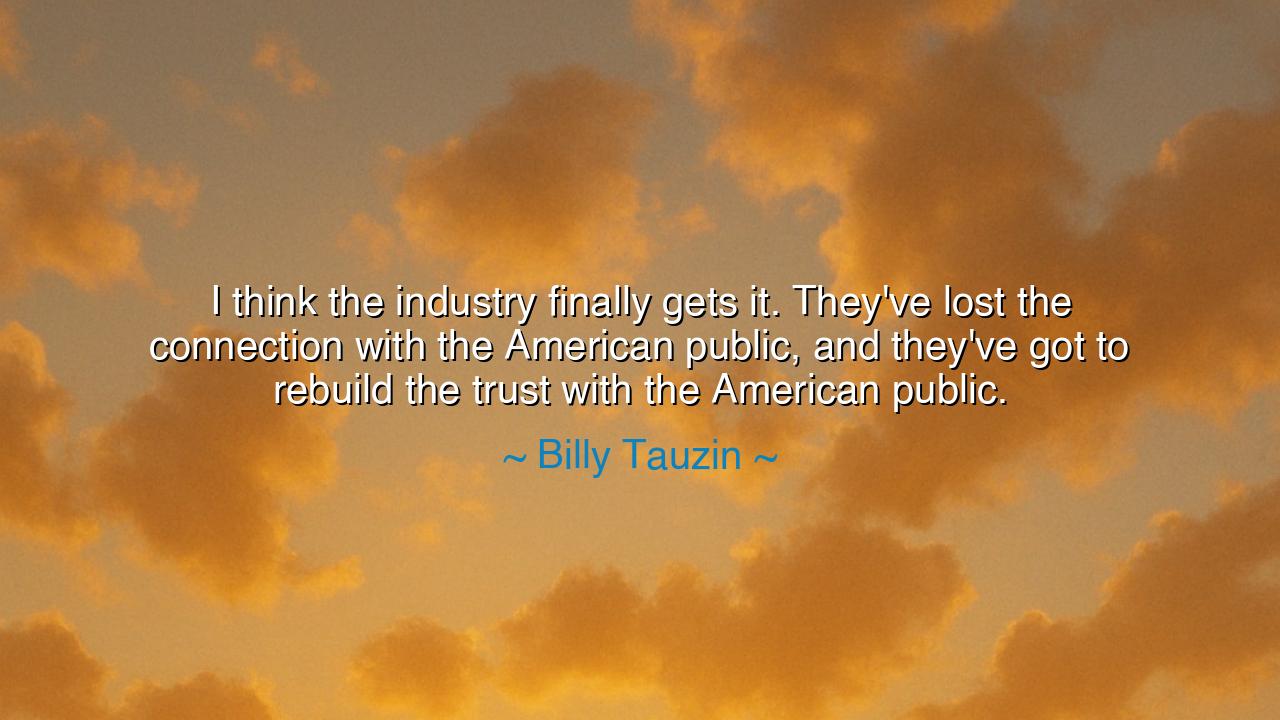
I think the industry finally gets it. They've lost the
I think the industry finally gets it. They've lost the connection with the American public, and they've got to rebuild the trust with the American public.






Hear the words of Billy Tauzin, spoken in the halls of power, yet echoing with truths as old as civilization: “I think the industry finally gets it. They’ve lost the connection with the American public, and they’ve got to rebuild the trust with the American public.” In this saying is the recognition of a sacred bond broken, the covenant between those who serve and those who are served, between the mighty who hold resources and the people whose lives are shaped by them. For without connection, there can be no loyalty; without trust, there can be no lasting power.
The origin of this wisdom lies in the eternal law that leaders, merchants, and rulers have always known: to govern or to prosper without the faith of the people is to build upon sand. An industry may thrive for a time by strength, monopoly, or cunning, but if it forgets the heart of the people, its foundations will weaken. History teaches that no empire, no institution, no trade endures without renewing the covenant of trust with those it touches. Tauzin’s words arise from this ancient pattern: a recognition that profit without trust is ruin disguised.
Consider the fall of the great East India Company. For centuries it wielded unimaginable wealth and influence, stretching its hands across continents. Yet when it abandoned fairness, when it ruled through arrogance and cruelty, it lost the connection with the very people it claimed to govern. Rebellion erupted, its charter was stripped, and its empire crumbled. Its treasures could not save it, because it had betrayed the bond of trust. This is the story Tauzin gestures toward: whenever industry forgets its duty to the public, it courts its own destruction.
At the same time, there are stories of renewal. In the early 20th century, the American food industry faced outrage as Upton Sinclair’s The Jungle exposed horrors in the slaughterhouses. Public trust was shattered. Yet when reform came—when laws of inspection were passed, when standards were raised—the connection with the people was slowly rebuilt. The lesson is clear: trust lost can be regained, but only with humility, transparency, and action. This is not merely commerce—it is the rebuilding of a moral covenant.
Tauzin’s words speak also to the human condition beyond politics or industry. Every relationship in life is built on the same fragile foundation. A friend who betrays another loses connection; a leader who lies to his people breaks trust; a family divided by dishonor must labor to restore it. The principle is the same, whether between nations, industries, or individuals: once trust is broken, it is the hardest wealth to restore, yet the most necessary for survival.
The lesson for us, then, is both practical and profound. If you are a leader, do not chase short-term gain at the cost of long-term faith. If you are a worker, honor the bond you share with those who rely upon you. If you are in friendship or family, guard your trust as your most precious treasure. And if you have lost it, do not despair—but labor patiently to rebuild it, as one might lay stone upon stone to raise again a fallen temple.
Therefore, remember Tauzin’s wisdom. Connection is the lifeblood of power; trust is the breath of all human endeavor. Without them, even the wealthiest industry or the strongest empire will fall. With them, even the smallest enterprise can endure. Build trust in your dealings, and renew it when it falters, for it is the only foundation upon which true greatness—whether of a man, a nation, or an industry—can stand.






SJHan Sara Ji
I wonder if the idea of ‘rebuilding trust’ is always the best path forward. Can industries truly return to where they once were in the eyes of the public, or is it more about finding a new approach? Maybe it's not about fixing what was broken but building a completely new foundation. Is that even possible, or are some scars too deep to heal in the public’s eyes?
NTNhat Nga Nguyen Thi
Billy Tauzin’s point about rebuilding trust seems so relevant today, especially in industries where public opinion can change quickly. It makes me wonder, though, is this a permanent problem for industries that have lost their trust? Or is it possible for them to recover and become stronger in the long run? What does rebuilding trust actually look like on the ground for an industry?
HTNguyen Tran Huyen Tram
I find this statement powerful because it acknowledges the damage done by losing trust. Companies often act like they can just fix the image with some marketing, but trust is earned. How long does it really take for people to trust a company again after a major betrayal? Can businesses even know when they’ve crossed that point of no return?
NYTran Duong Nhu Y
This quote resonates because it highlights the importance of trust in any industry. When companies lose their connection with the public, it’s not just about bad PR – it’s a real breakdown of credibility. How can businesses start over after they’ve lost that trust? Is rebuilding it even possible, or is it just about trying to regain some semblance of respect, rather than full trust?
MTNguyen ha minh thu
Billy Tauzin’s quote makes me think about the relationship between industries and the public. It’s true that many companies, especially in industries like pharmaceuticals and tech, seem to have lost touch with the people they serve. If this is the case, what steps can industries take to regain public trust? Can it ever truly be rebuilt, or does the damage sometimes go too deep?